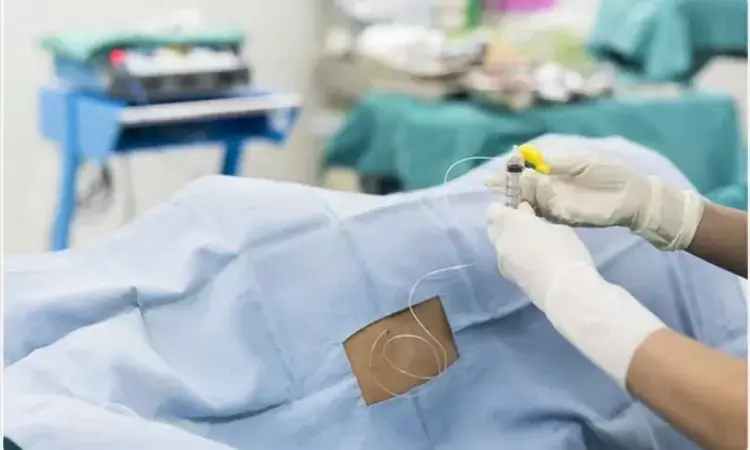- Home
- Medical news & Guidelines
- Anesthesiology
- Cardiology and CTVS
- Critical Care
- Dentistry
- Dermatology
- Diabetes and Endocrinology
- ENT
- Gastroenterology
- Medicine
- Nephrology
- Neurology
- Obstretics-Gynaecology
- Oncology
- Ophthalmology
- Orthopaedics
- Pediatrics-Neonatology
- Psychiatry
- Pulmonology
- Radiology
- Surgery
- Urology
- Laboratory Medicine
- Diet
- Nursing
- Paramedical
- Physiotherapy
- Health news
- Fact Check
- Bone Health Fact Check
- Brain Health Fact Check
- Cancer Related Fact Check
- Child Care Fact Check
- Dental and oral health fact check
- Diabetes and metabolic health fact check
- Diet and Nutrition Fact Check
- Eye and ENT Care Fact Check
- Fitness fact check
- Gut health fact check
- Heart health fact check
- Kidney health fact check
- Medical education fact check
- Men's health fact check
- Respiratory fact check
- Skin and hair care fact check
- Vaccine and Immunization fact check
- Women's health fact check
- AYUSH
- State News
- Andaman and Nicobar Islands
- Andhra Pradesh
- Arunachal Pradesh
- Assam
- Bihar
- Chandigarh
- Chattisgarh
- Dadra and Nagar Haveli
- Daman and Diu
- Delhi
- Goa
- Gujarat
- Haryana
- Himachal Pradesh
- Jammu & Kashmir
- Jharkhand
- Karnataka
- Kerala
- Ladakh
- Lakshadweep
- Madhya Pradesh
- Maharashtra
- Manipur
- Meghalaya
- Mizoram
- Nagaland
- Odisha
- Puducherry
- Punjab
- Rajasthan
- Sikkim
- Tamil Nadu
- Telangana
- Tripura
- Uttar Pradesh
- Uttrakhand
- West Bengal
- Medical Education
- Industry
Epidural Analgesia not related to Autism Spectrum Disorder: JAMA

In a study led by Anders Pretzmann Mikkelse and colleagues, it was discovered that epidural analgesia during delivery was not related with autistic spectrum condition in children. This study was done to validate a recent cohort research, epidural analgesia during delivery was linked to an elevated incidence of autism in kids.
The goal of this study was to see if having a labour epidural increased the chance of autism in the kids. The findings of this study were published in Journal of the American Medical Association on 28th September, 2021.
Between January 2006 and December 2013, all live-born children in Denmark were included in this countrywide retrospective cohort research. The follow-up began on the first birthday of the children and finished in December 2017. Among the 485 093 live-born children, 5915 were removed due to events during the first year of life such as death, emigration, birth misregistration, diagnosis of illness intrinsically related to autism, or autism diagnosis. Cox regression was used to calculate the hazard ratios, which were adjusted for variables such as maternal comorbidity, sociodemographic characteristics, lifestyle, pregnancy, mental disease, psychotropic medication, medical-seeking behaviour, and a family history of autism. In a supplementary study, a within-mother design was utilized to include only children of mothers who had both exposure and non-exposure to labour epidural analgesia in different births.
In this countrywide retrospective cohort research of 479 178 Danish children, mother epidural analgesia during birth was not significantly linked with autistic spectrum disorder in offspring as compared to no epidural analgesia during delivery. The cohort comprised 479 178 children, with 92 900 (19.4%) receiving epidural analgesia during delivery. The average length of follow-up was 7.0 years, and by the conclusion of the study, 6428 children (1.3 percent) had been diagnosed with autism. The incidence rate of autism diagnosis in exposed children was 23.1 per 10,000 person-years, compared to 18.5 per 10,000 person-years in the unexposed group.
With all the outcomes and discussion, it was made clear that during childbirth, epidural analgesia was not linked with autistic spectrum disorder in children, and so was concluded by the researchers.
Reference:
Mikkelsen, A. P., Greiber, I. K., Scheller, N. M., & Lidegaard, Ø. (2021). Association of Labor Epidural Analgesia With Autism Spectrum Disorder in Children. JAMA, 326(12), 1170. https://doi.org/10.1001/jama.2021.12655
Medical Dialogues consists of a team of passionate medical/scientific writers, led by doctors and healthcare researchers. Our team efforts to bring you updated and timely news about the important happenings of the medical and healthcare sector. Our editorial team can be reached at editorial@medicaldialogues.in.
Dr Kamal Kant Kohli-MBBS, DTCD- a chest specialist with more than 30 years of practice and a flair for writing clinical articles, Dr Kamal Kant Kohli joined Medical Dialogues as a Chief Editor of Medical News. Besides writing articles, as an editor, he proofreads and verifies all the medical content published on Medical Dialogues including those coming from journals, studies,medical conferences,guidelines etc. Email: drkohli@medicaldialogues.in. Contact no. 011-43720751


